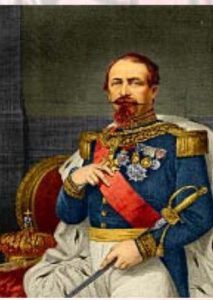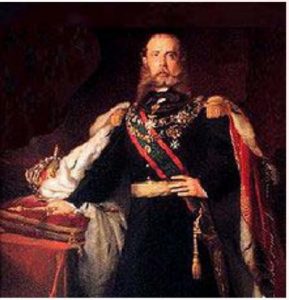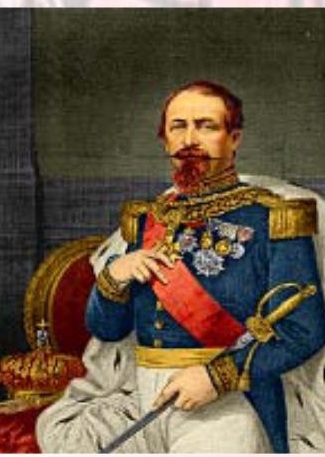By David Fitzpatrick from the July 2010 Edition
Part 1: The Invasion
One of the most unexpected and remarkable episodes in the History of Mexico occurred in the middle of the 19th century when a credit squeeze in the Mexican economy encouraged the ambitions of an upstart European « Emperor » and led to an invasion by foreign forces and the establishment of an “Empire” in this country. This is the story of the Emperor Maximilian of Mexico.
In July 1861, President Benito Juarez, in an attempt to solve a severe debt crisis, suspended interest payments on Mexico’s foreign liabilities to 17 governments, for the most part, in Europe. Three of those governments, Britain, France, and Spain, after consultation, resolved to enforce payment of the debts by military means.
In January 1862, a combined fleet of British, French, and Spanish forces appeared at Veracruz. Meeting relatively little resistance, they quickly compelled the surrender of Campeche and other ports along the Caribbean and Atlantic coasts. On the Pacific, the French fleet blockaded Mazatlan.
It quickly became clear that, for the French, the mission was much more than just a debt-collecting operation. The ambitious French Emperor, Napoleon III saw Mexico as a possible target for his imperial aspirations. When the British and the Spanish understood that Napoleon intended to conquer Mexico, they withdrew their fleets.
Louis-Napoleon Bonaparte, the nephew of the great Napoleon, had managed to install himself at the head of the French state, initially by democratic means: he was elected President of the Second French  Republic which followed the dethronement of King Louis-Philippe in 1848. As soon as it became politically possible, however, he abolished the new republic and proclaimed himself Emperor as “Napoleon III”. (Napoleon II was presumably Napoleon I’s only son– who never actually reigned.)
Republic which followed the dethronement of King Louis-Philippe in 1848. As soon as it became politically possible, however, he abolished the new republic and proclaimed himself Emperor as “Napoleon III”. (Napoleon II was presumably Napoleon I’s only son– who never actually reigned.)
Napoleon III was determined to repeat the exploits of his illustrious uncle, but his various attempts in that direction were almost comically inept. One operation after another ended in more or less complete and ignominious failure. The inadequacy of the Emperor to the task he had set for himself was the subject of constant humorous commentary (in secret) by French intellectuals Victor Hugo, one of the few who dared to speak out in public, wrote a pamphlet comparing Napoléon le Grand et Napoléon le Petit. This earned him twenty years of exile on the Island of Jersey.
Following the departure of the British and Spanish, Napoleon mounted an invasion in force of the East Coast and interior of Mexico. His troops advanced steadily towards the capital over a period of several months. Their one great setback was the battle of Camaron where 62 members of the famous Légion Étrangère were set upon by three battalions of the Mexican Army. The Légionnaires fought bravely to the last man and their heroic defeat occupies a major place in French military folklore. To this day, the anniversary of Camaron is the most important date on the calendar of the Légion. It is also a major historic date in Mexico (Cinco de Mayo). For Mexico, after all, Camaron was a victory!
After a year and a half of fighting, in July 1863, the French Army entered Mexico City. President Juarez and his government withdrew to Chihuahua where they founded a Government in Exile which continued to function throughout the entire period of the French occupation.
The French established a Junta Superior of Mexican notables who formed a provisional government. The new regime enjoyed the support of a large, conservative segment of the Mexican population who  favored a strong authoritarian government.
favored a strong authoritarian government.
On instructions from Napoleon, the Junta proclaimed the “Catholic Empire of Mexico” and offered the throne and the title of “Emperor” to the Archduke Maximilian, younger brother of the highly reactionary Emperor Franz-Joseph of Austria and Hungary. Maximilian, who had been disappointed and humiliated for many years by his brother’s refusal to give him any significant role in the Austrian administration, accepted immediately. He saw this unexpected opportunity as compensation for a lifetime of frustration. Not to mention that, as an emperor in his own right, he could now meet his elder brother on an equal footing. Preparing enthusiastically to assume his new role, he disembarked at Veracruz in May 1864..
Download the full edition or view it online





You must be logged in to post a comment.